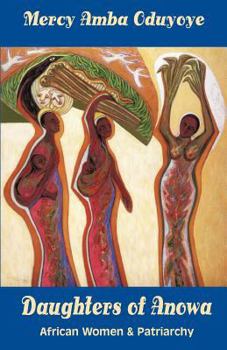Daughters of Anowa
Select Format
Select Condition 
Book Overview
Daughters of Anowa provides an analysis of the lives of African women today from an African woman's own perspective. It is a study of the influence of culture and religion - particularly of traditional African cultures and Christianity - on African women's lives. Mercy Amba Oduyoye illustrates how myths, proverbs, and folk tales (called "folktalk") operate in the socialization of young women, working to preserve the norms of the community. Daughters...
Format:Paperback
Language:English
ISBN:0883449994
ISBN13:9780883449998
Release Date:March 2005
Publisher:Orbis Books
Length:240 Pages
Weight:0.69 lbs.
Dimensions:0.5" x 5.5" x 8.3"
Customer Reviews
2 ratings
Feminism from an Asante/Yoruba Perspective, from the Heart and Mind
Published by Thriftbooks.com User , 15 years ago
I read the 2005 edition of the 1995 book. Written from a Christian perspective by an Asante (Ghana) raised author, she will not remain uncritical of the Western and African Churches. Mercy Amba Oduyoye also lived among the Yoruba of Nigeria and uses Jamaican proverbs. Anowa is a mythical woman, prophet, and priest whose life of daring, suffering, and determination is reflected in Africa. Oduyoye transforms her into Africa's ancestress. Language, culture and the vision of identity are her main chapters. Specific topics include marriage and polygyny, construct and defamations of "witches", menstruation (If you overstand German, you may also be interested in Das Schwarzmond - Tabu. Die kulturelle Bedeutung des weiblichen Zyklus. and/or the unorthodox Heliogabalus: Or, the Crowned Anarchist [English translation]). The Western - African gender confrontation is well-analyzed. And at times funny, e.g. when the Europeans wondered at some point, why in all those years they didn't find out that women were much more important to the Akan. Well, the Akan knew that the Europeans didn't value women and only let the Akan men talk to the Europeans. Which reminds me of modern Western claims with some other cultures, in reverse. The author has as much heart as she shows well analyzing capabilities. Her spirit of mind is that of solidarity. Including with all sorts of minorities which get discriminated in similar books. Which alone, but not only, makes this book a far better recommendation than those by other authors. You may also be interested in The Invention of Women: Making an African Sense of Western Gender Discourses, Re-Inventing Africa: Matriarchy, Religion and Culture and Return to the African Mother Principle of Male and Female Equality.
Powerful stories
Published by Thriftbooks.com User , 18 years ago
Narrative theology has long been a theological style that speaks to me with power, as the stories of people contain theological and philosophical truths that are often missed in more objective and academic treatments (not that these are not similarly worthwhile). Jesus spoke in parables; the Talmud and Hebrew scriptures demonstrate God's presence in stories; many cultures have found power in the recitation of key stories. However, some stories have been ignored and overlooked. One of the projects of the modern and postmodern world has been the recovery of voices and stories from those that were silenced and lost in the past. Mercy Amba Oduyoye, a native of Ghana and theologian of worldwide acclaim, has drawn together stories that highlight the issues of women in Africa both in cultural and religious terms. Mercy Amba Oduyoye describes herself as having come from the Akan people, who were matrilineal and had many stories of women in leadership positions, both economically and prophetically. This was different from the Yoruba and British-influenced areas of Nigeria, where women were very much subject to their husbands or other male-dominated structures. 'In Africa, the very idea of a "free woman" conjures up negative images,' Mercy Amba Oduyoye writes. 'A "free woman" spells disaster.' Oduyoye take on the challenge of presenting a liberation theology in careful terms in three overarching narrative cycles. These look at the issues of language, culture and identity respectively. She weaves into these cycles folktales, mythological stories, and more current stories to illustrate the importance of the humanity of women in these times and places. 'The stories are aimed at demonstrating that, by and large, the Akan woman is not so much an active participant in her own suppression as a passive victim of the culture whose life-giving aspects she seeks to protect.' This leads not only to an exploration of the culture and the ways in which society draws gender and identity roles into play, but also to the third cycle of stories - what should women become? What are their dreams, hopes, and true abilities? Oduyoye draws in her own experience as a woman of the culture and a woman who has had broader experiences than most of her community to tap into the resources from outside that can cause deeper reflection into her own circumstances. Life is lived in community, and there is need for justice in this role. While some argue that male and female are complementary in many respects, it is in some ways a false dichotomy. 'In practice, complementarity allows the man to choose what he wants to be and to do and then demands that the woman fill in the blanks.' Oduyoye begins and ends with stories, and lets the powerful stories fill the journey with insight.





